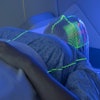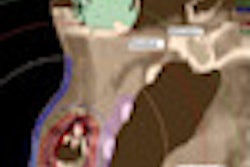Breast cancer patients who undergo radiation therapy do not have increased cardiac morbidity compared with patients undergoing radical mastectomy, indicating that routine radiation therapy is safe, according to a study presented at the American Society for Radiation Oncology (ASTRO) meeting in Boston.
The study included 247 stage I and II breast cancer patients who were enrolled in the U.S. National Cancer Institute (NCI) breast conservation trial from 1979 to 1987. Of this group, 102 individuals were alive 25.7 years after treatment, and 50 of these patients were included in the cardiac research: 26 had received breast conservation therapy including radiation and 24 underwent mastectomy.
The group underwent CT angiography, cardiac MRI, and cardiac lab tests to evaluate coronary artery stenosis and assess for elevated coronary artery calcium. A single experienced cardiologist blinded to the clinical arm of the study evaluated all exams, according to lead author Dr. Charles Simone II, from the Hospital of the University of Pennsylvania, and colleagues.
Patient characteristics, exam findings, and lab results were similar for mastectomy patients versus those who received breast conservation therapy, the researchers reported, though breast conservation patients had lower diabetes rates (3.8% versus 12.5%) and slightly lower blood pressure.
Based on the Framingham risk score for developing myocardial infarction within 10 years, the risk was 5.1% for breast conservation patients, compared with 5.7% for the mastectomy cohort.
Calcium scores were similar for both groups, along with diastolic function, peak mid-wall strain, and chamber mass, volume, and function. Two mastectomy patients had a prior myocardial infarction and one had heart failure. There were no signs of myocardial fibrosis, but one patient in each group experienced pericardial thickening, according to the researchers.
Over the generation-long study period, radiation therapy has become more precise and safer with modern techniques, Simone said. The safety of radiation therapy means it can be routinely incorporated into the treatment regimen, he said.



















